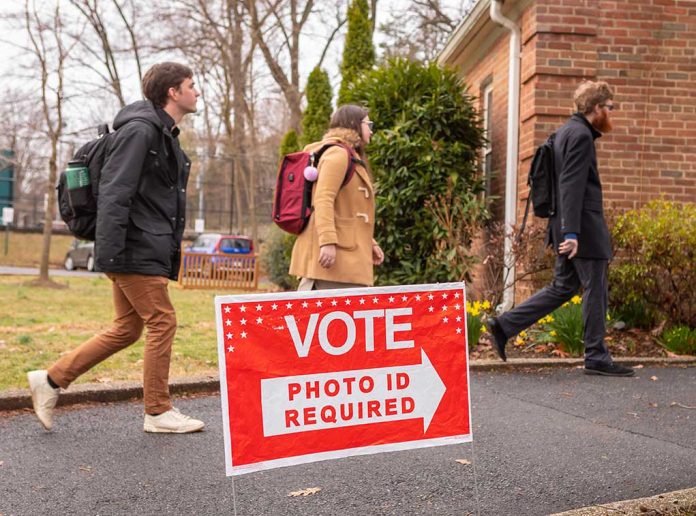
Voter ID laws in Texas and Georgia show minimal impact on turnout while bolstering electoral integrity, challenging narratives of voter suppression.
At a Glance
- Data from Texas and Georgia elections challenges claims that voter ID laws suppress voter turnout.
- Voter ID requirements for mail-in ballots do not suppress voter participation, according to the Honest Elections Project.
- Georgia saw decreased rejection rates and high voter turnout after implementing new ID requirements.
- Texas experienced an initial spike in mail ballot rejections, but rates returned to historical norms by the 2022 midterms.
- Studies show voter ID laws do not disproportionately affect minority turnout.
Voter ID Laws: Securing Elections Without Suppressing Votes
The ongoing debate surrounding voter ID laws in the United States has been a contentious issue, with proponents arguing for enhanced electoral security and opponents claiming voter suppression. Recent data from Texas and Georgia, however, presents a compelling case that challenges the narrative of voter ID laws dramatically decreasing voter turnout, especially among marginalized groups.
The Honest Elections Project (HEP) report reveals that voter ID requirements for mail-in ballots do not suppress voter participation. This finding contradicts long-standing claims by some politicians and activists who have argued that such laws create insurmountable barriers for certain demographics.
Exclusive: Texas, Georgia Election Data Shatters Democrats’ Voter ID Lieshttps://t.co/YDFoMBgrHy
— The Federalist (@FDRLST) November 4, 2024
Texas and Georgia: A Tale of Two States
In Texas, the implementation of new ID requirements for mail ballots initially led to a spike in rejections. However, by the 2022 midterms, rejection rates had returned to historical norms. This suggests that while there may be a learning curve associated with new voting procedures, voters can adapt relatively quickly.
“Rejection rates for mail ballots in that election actually decreased, going from approximately 4.3% in the 2018 Primary Election to just 1% in the May 2022 Primary election,” is stated in the HEP report obtained by The Federalist.
Georgia’s experience provides even more compelling evidence. With over a year to implement and educate voters on new ID requirements, the state saw decreased rejection rates and high voter turnout. This outcome directly contradicts predictions of widespread disenfranchisement and suppressed participation.
The Importance of Voter Education and Implementation
The success of voter ID laws in maintaining electoral integrity without suppressing turnout can be attributed in part to effective implementation and voter education efforts. As the HEP report notes, “The data tells the real story. As with any change, education and practice are critical components of successful implementation.”
“The electoral system cannot inspire public confidence if no safeguards exist to deter or detect fraud or to confirm the identity of voters. Photo IDs currently are needed to board a plane, enter federal buildings, and cash a check. Voting is equally important. Voter fraud does exist, and criminal penalties imposed after the fact are an insufficient deterrent to protect against it,” said the Commission on Federal Election Reform.
This perspective emphasizes the dual importance of securing elections and ensuring voter access. By implementing reasonable safeguards while also providing ample education and resources to voters, states can strike a balance that maintains the integrity of the electoral process without creating undue barriers to participation.
Debunking Myths and Misinformation
Despite the evidence supporting the efficacy and fairness of voter ID laws, misinformation continues to circulate. It’s crucial for voters to seek out accurate information from reliable sources. The Cybersecurity and Infrastructure Security Agency (CISA) provides a “Rumor vs. Reality” resource to counter disinformation about elections and provide accurate information to the public.
As the debate over voter ID laws continues, it’s essential to rely on factual data and empirical evidence rather than partisan rhetoric. The experiences of Texas and Georgia demonstrate that well-implemented voter ID laws can enhance electoral integrity without compromising voter access, providing a model for other states to follow in securing fair and honest elections.





